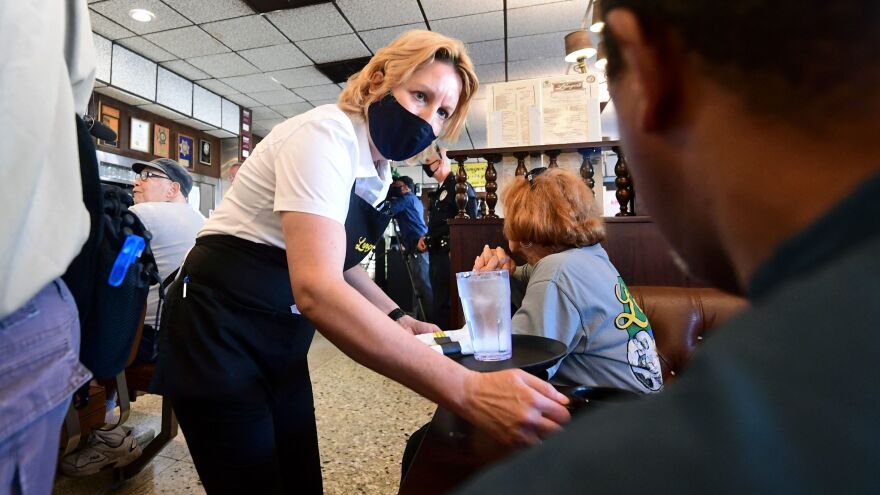Normal is not easily defined.
The past 15 months, though, have certainly been anything but.
Americans are starting to believe a "sense of normal" is approaching fairly soon, however, according to a new NPR/PBS NewsHour/Marist survey. The poll also found that with the coronavirus receding in this country, mask-wearing is declining and Americans are going out more. But they remain cautious about being in large crowds.
As the country continues to open up, more focus turns to the economy, which cratered during the beginning of the pandemic last year. And Americans are split by race, gender and politics on whether President Biden's ambitious policies are helping or not.
Race, gender and party divides on Biden and the economy
Three months ago, in a similar survey, 49% of adults said the president's policies were strengthening the economy, while 44% said they were weakening it.
Now, that's declined a net of 6 points, as 44% of respondents in the new poll say Biden's policies have strengthened the economy and 45% say the opposite. The percentage who were unsure also jumped 4 points. It's all a little bit of a warning sign for Biden as he pushes for two large — and expensive — spending packages.
There are significant splits by race and gender:
Inflation vs. wages by party
A quarter of Americans rank inflation as the U.S. economy's top concern. That's followed by wages, unemployment, housing costs, labor shortages, gas prices and interest rates.
But there's a sharp political divide on the question. Republicans and independents rank inflation as their top concern, while for Democrats, it was wages. Just 4% of Republicans said wages were their top concern.
Loading...
Return to "normal"
Americans are growing increasingly optimistic about when life will return to a "sense of normal," as the survey labels it.
In April, three-quarters of Americans said they believe it will take six months or more. Now, it's just half. About a quarter (27%) say it will be less than six months, up from 15% two months ago.
People are also growing more comfortable doing certain things, saying they're:
But they are not as comfortable doing others:
COVID-19 vaccines and going back to work
While half say they are concerned about another coronavirus surge, almost 9 in 10 U.S. adults with jobs say they are at least somewhat comfortable returning to work.
Notably, a majority (57%) of those with jobs do not believe employers should require COVID-19 vaccines as a condition to return to in-person work.
More than a quarter of Americans say they will not get vaccinated. The most resistant to getting vaccinated continue to be supporters of former President Donald Trump. Half of them say they won't get the shot, the highest of any group surveyed. Trump has touted the vaccine and got it himself.
Since Centers for Disease Control and Prevention guidelines came out, noting that Americans who have been vaccinated can largely set masks aside, there's been a double-digit decline in those saying they wear a mask even when it's not required.
There's also been a double-digit increase in those saying they generally do not wear a mask. In May, 49% said they wore masks even when it was not required. Now, that's just 36%.
One in five said they generally do not wear masks. Two months ago, it was less than 1 in 10.
Affordability, not the coronavirus, is limiting vacations
Speaking of getting back to normal, a majority of Americans say they plan to take a vacation this summer.
But of the significant minority (45%) who say they aren't taking one, almost three times as many cited affordability (35%) as the main reason for not going, as opposed to concerns about COVID-19 (12%).
Methodology: The poll of 1,115 U.S. adults was conducted using live telephone interviewers from June 22-29. Survey questions were available in English or Spanish. The full sample has a margin of error of plus or minus 3.7 percentage points with larger margins of error for smaller group subsets.
Copyright 2023 NPR. To see more, visit https://www.npr.org.



